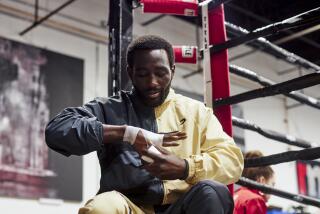‘G-Man’ in the Dark After a Bright Future
- Share via
FREEPORT, Ill. — The living room of the little house is dark, illuminated only by a television he cannot see.
There was a time not so long ago when Gerald McClellan was one of the most feared fighters in the world. Now he sits on a couch, holding a visitor’s hand as if he’s afraid to let go.
“Squeeze me,” he pleads. “Squeeze my hands.”
I do just that. As McClellan squeezes back, questions tumble out.
“How long have you been here? Are you hungry? What did you eat today?
“You write? You a photographer? Are you Teddy?”
The large hands that knocked out 29 middleweights are still strong. McClellan keeps squeezing.
“You drive? What did you drive? What color is it? You got a favorite color?”
McClellan pulls the visitor toward him.
“Closer. Come closer. Squeeze me. Squeeze.
“What color is air? Why don’t air have a color? Does water have a color?”
The colors are all in McClellan’s mind now, swirling amid a jumble of other thoughts that he can’t keep in order. His brain functions only in spurts, then quickly short-circuits.
He’s blind, nearly deaf and only recently has been able to use a walker to get around.
If McClellan could see, he might be reminded of what happened that night eight years ago when a world that had been so bright suddenly went dark.
In a nearby corner, his championship belts are in a display case. On a wall is a painting of the fight in London with Nigel Benn that ended so tragically.
McClellan’s upper body is still chiseled. Sitting here, at age 35, he almost looks as if he could fight today.
Then he begins to talk.
“Teddy? Is that Teddy?” he asks.
“No,” his sister, Lisa, replies, “it’s Tim.”
“Tim? You write? Where are you from? Are you hungry? What is your favorite meal?
“Tim, come closer.
“Squeeze me. Squeeze me harder.”
*
The G-Man was as ferocious as fighters come, a lanky 160-pounder with devastating power and a menacing aura that frightened people inside the ring and out. He had a stable of fighting pit bulls, a habit of knocking out opponents in the first round.
He beat Roy Jones Jr. in the National Golden Gloves as an amateur, and McClellan likely would have gotten rich against Jones in a megafight had tragedy not intervened.
“They both had equal speed and moves,” former trainer Emanuel Steward said. “But Gerald was such a heavy-handed puncher.”
On this summer day, he seems to remember that he used to fight. He seems to recall knocking people out.
“You smoked them,” Lisa says.
“Like a cigarette?” McClellan asks.
He wants to know why he isn’t still fighting.
“You’re retired,” Lisa says.
“How many years?”
“Eight years.”
“The reason?”
“You got hurt. You know.”
*
A rowdy crowd of about 11,000 had gathered for the night in the dank London Arena, hoping against hope that their man could do something against the fearsome American. It was Feb. 25, 1995, and McClellan was a heavy favorite to beat an aging Benn and take his 168-pound title.
Benn knew McClellan’s reputation well.
“He’s the man who comes out and destroys people with one punch,” Benn said.
McClellan, though, was troubled from the moment he arrived in England. He had split with his manager and trainer, and was overwhelmed trying to deal with the fight issues they used to handle. In his dressing room before the fight, he wrapped his own hands, alone.
It shouldn’t have mattered. McClellan was getting used to stopping fights almost before they began, and soon Benn was in trouble. McClellan hit him with a barrage of punches in the first round, including a devastating right that knocked Benn out of the ring and left him draped over some television monitors at ringside.
But Benn was saved by a long count, then began holding his own. McClellan was still winning on two scorecards as the fight went into the 10th round, but he was getting hit with rabbit punches on the back of his head that were hurting. His mouthpiece was dangling.
Midway through the 10th round, he went down to one knee after an exchange. The referee began counting him out in French, and McClellan got up at seven, blinking rapidly. Benn hit him with a series of punches and McClellan slid to the canvas, again on his right knee.
In the arena, the fans went wild as he was counted out, still on one knee. Benn celebrated too not noticing that McClellan had fallen off his ring stool and was now slumped in the corner, with doctors frantically attending to him.
In the ambulance, McClellan was still coherent enough to take off his oxygen mask and ask what happened. But swelling in his brain worsened, and doctors had to drill a hole in his head and perform four hours of surgery on a large blood clot before inducing a coma to try to stem the damage.
In the next cubicle over was Benn, who was hospitalized himself after the brutal bout.
Six weeks later, McClellan was airlifted to a hospital in Milwaukee.
Six months later, he went home to Freeport, a grimy town two hours outside of Chicago, where a rare visitor added some interest to a recent day.
“Who’s here?” he asks.
“Tim.”
“Teddy?”
“No, Tim.”
*
McClellan lives in a world of repeated questions and answers he can’t remember. To talk, he likes to tap in rhythm on his knee, and the words come out with a singsong effect.
His life revolves around sisters Lisa and Sandra, who take turns caring for him, although he frequently sees his 9-year-old daughter, who lives just a few blocks away. McClellan’s two sons live in Detroit, where the younger, 14-year-old Mandel, is an amateur fighter.
On a typical day, McClellan will get up and have his favorite cereal, Fruity Pebbles, for breakfast. If it’s a real good day, Lisa will take him to a park, where he’ll eat two Quarter-Pounders with cheese from McDonalds.
Those burgers and grape soda are his biggest treat, although Lisa has cut off his pop supply.
“Is there grape pop?” McClellan asks.
“No pop,” Lisa replies.
“Why? We don’t have any?”
“G-Man, pop is bad for you.”
“What color is grape pop? Does water have color?”
Lisa, who is going to night school to become a registered nurse, is stubbornly protective of her brother. She decides who gets to see him, and she helped organize a February fund-raiser for McClellan and fellow fighter Greg Page.
Basically, Lisa has given up her other life to take care of the G-Man.
“I think it’s gotten easier as time has gone by,” Lisa said. “In the beginning, it took me a long time to adjust to not having the freedom to have a normal life. Even little things like going to the grocery store you have to do around his schedule.”
Fight photographer Teddy Blackburn has made it his personal crusade to keep McClellan’s name alive and brought him to New York last year to share an award from fight writers.
There, middleweight champion Bernard Hopkins met with him.
“It’s like he’s a baby,” Hopkins said when he saw him. “And it’s like he’s 100 years old.”
Blackburn knows that it’s painful for other fighters to see.
“When you see Gerald for the first time, it will change the way you feel about boxing,” he said.
There’s no pension for fighters, and no funds for injured boxers, and Lisa worries about the costs of years of care. McClellan was a champion, but in a world with fractured titles, he never really made big money.
For the Benn fight, his purse was $250,000, but he came away with only $62,920.75
*
By mid-afternoon on a recent visit, McClellan was growing weary.
“You’re tired,” Lisa says.
“Steve? Is that Steve?”
“No, it’s Tim.”
“Tim, where are you staying? Stay here and rest. How long are you here?
“How tall are you? How much do you weigh?
“What’s your favorite meal?”
It was one of McClellan’s better days, the kind that gives Lisa hope.
“Something I usually tell people and they have a really hard time understanding is that considering everything he’s been through, he’s happy,” she said. “He’s content. He doesn’t complain about what has happened to him.”
Blackburn isn’t so sure.
“Let’s be honest; he really doesn’t know where he is,” he said. “Reality is entirely different.”
On this day, Lisa’s 15-year-old daughter Tyesha was in and out before leaving to go to work at a day-care center.
“How old should Tyesha be before I let her go on a date?” Lisa asks Gerald.
“She has to be 50,” the G-Man replies.
McClellan wants Tyesha to hold his hand and talk to him. She doesn’t have time.
“Uncle Gerald, I have to go now,” Tyesha says, walking out the door.
“How old is Tyesha?” McClellan asks after she leaves.
“What grade is she in?
“Does she have a favorite meal?”
*
Gerald McClellan Trust, c/o Fifth Third Bank, P.O. Box 120, Freeport IL 61032
More to Read
Go beyond the scoreboard
Get the latest on L.A.'s teams in the daily Sports Report newsletter.
You may occasionally receive promotional content from the Los Angeles Times.










